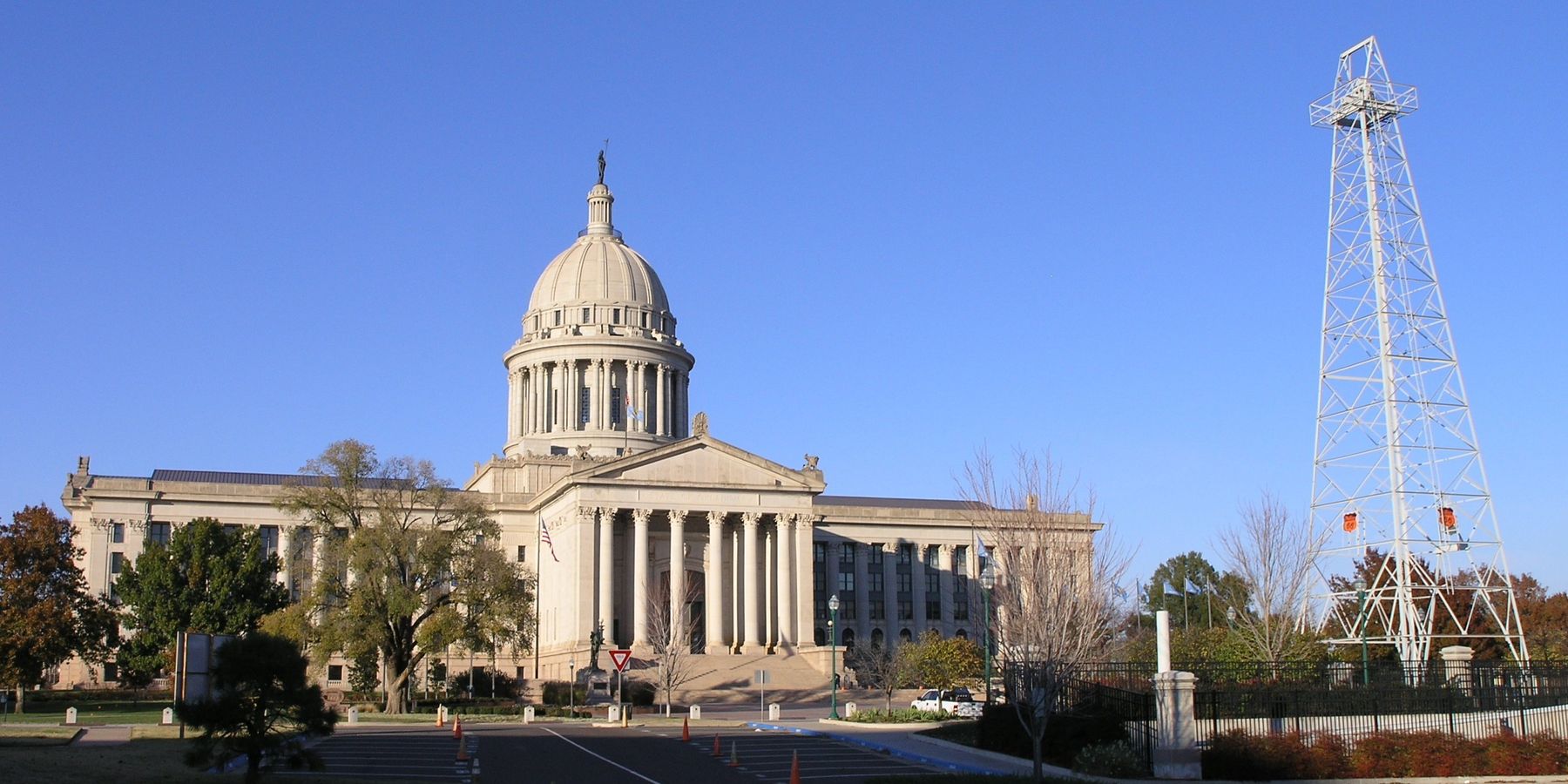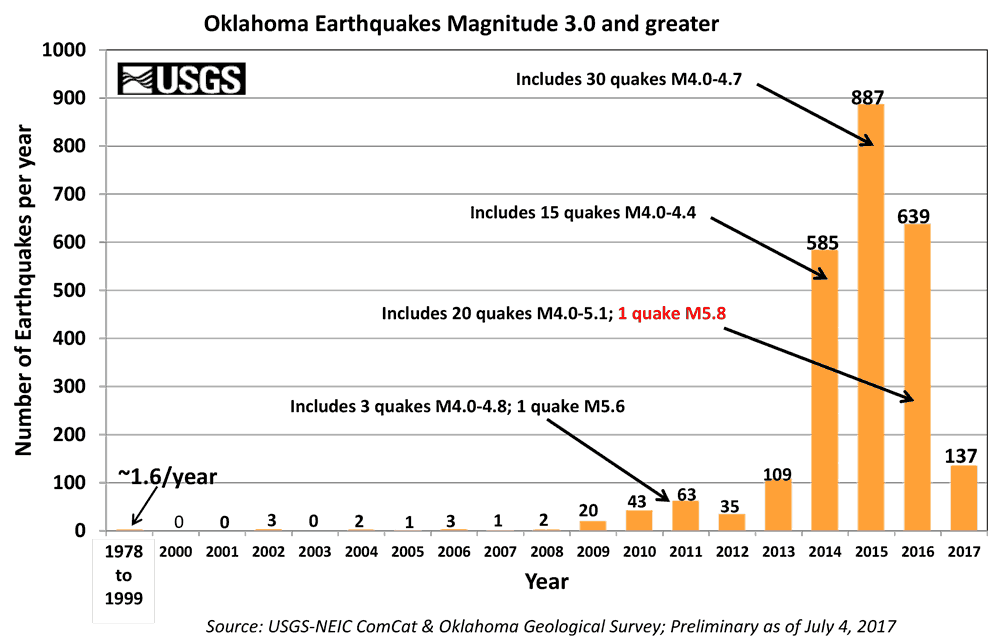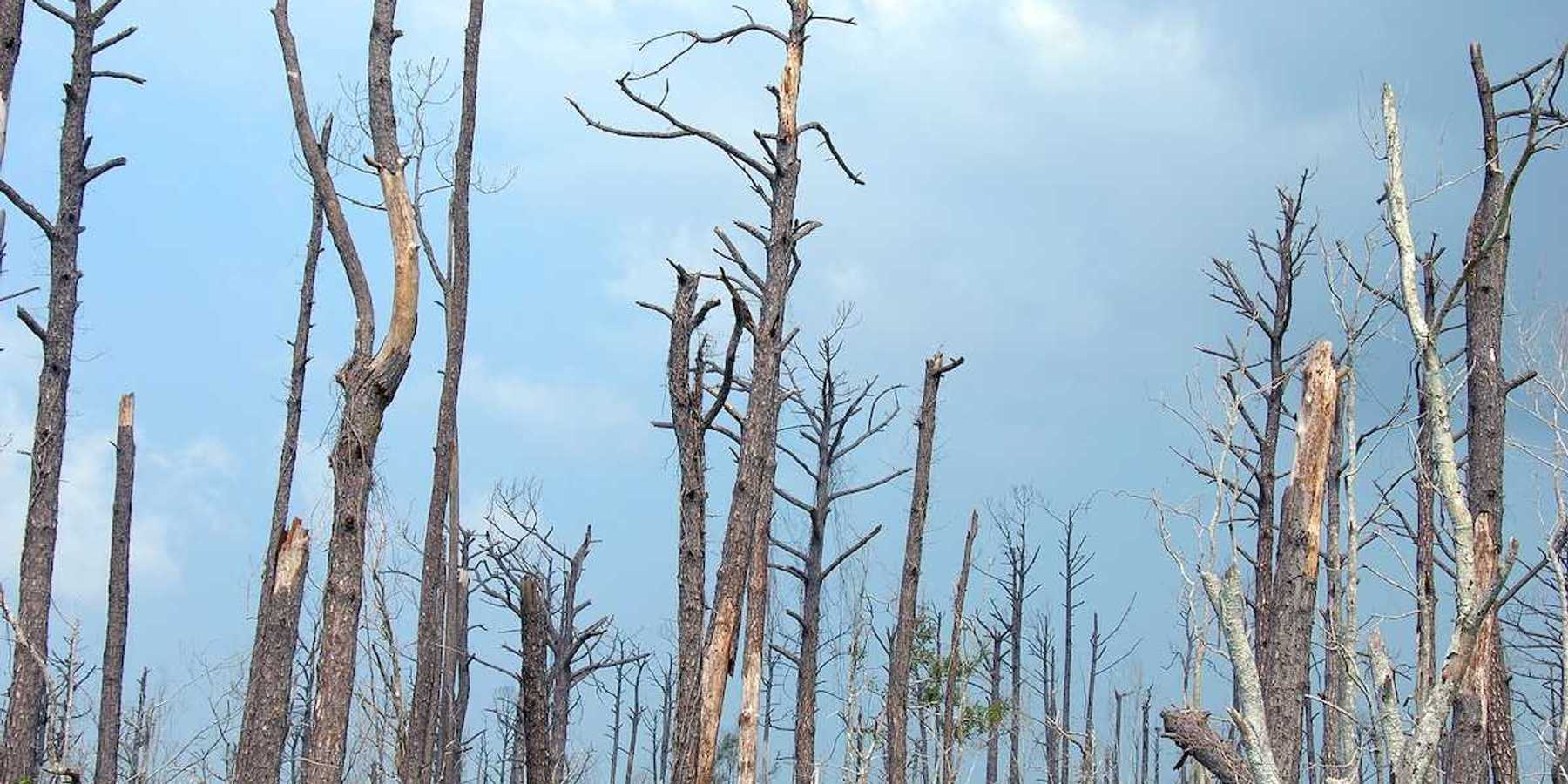
More earthquakes, more anxiety in Oklahoma
Oklahomans' Google searches for anxiety increase following earthquakes, according to a new study.
If researcher Joan Casey pulled Oklahoma Google search data for the month of June, she would expect to see an increase in searches for anxiety. That's because on June 15, a magnitude 4 earthquake hit Oklahoma.
Oklahoma isn't an earthquake-prone area, naturally. However, over the past decade, there's been a sharp increase in wastewater injection wells, which store wastewater produced from oil and gas drilling. The state has roughly 3,800 disposal injection wells, according to the Oklahoma Corporation Commission.*
The fluid pumped underground can change alter pressure in faults, spurring quakes.
Oklahoma had some seismic activity prior to 2008, with one or two earthquakes (magnitude 3 or higher) a year. But that jumped in 2009, going from two in 2008 to 20 in 2009. In 2015, Oklahoma experienced 887 magnitude 3 or higher earthquakes, according to the U.S. Geological Survey.
Between June 2008 and July 2017, Oklahoma saw more than 2,600 magnitude 3 or higher earthquakes. The USGS now says that Oklahoma has more earthquakes on a regular basis than California. And Casey, a postdoctoral researcher at University of California Berkeley, found that more earthquakes means more Google searches for anxiety, according to a recently published study in the journal of Environmental Epidemiology.
"It does appear that the population of Oklahoma is reacting to these earthquakes, and that might be something policy makers and others will want to take into account when deciding how to move forward with fracking in the state and how to move forward with the safe wastewater reinjection if they continue with the practice," she said.
Casey pulled monthly Google search data from January 2010 to May 2017, and looked for searches during the months where Oklahoma had a magnitude 4 or higher earthquake. Casey and co-authors found that anxiety-related Google searches increased by 1.3 percent in the month following an earthquake, and 5.8 percent if there was more than one earthquake in a month.
The researchers tracked the amount of Google searches for anxiety from 2010 to 2017 for the U.S., as well as just Oklahoma and found that while anxiety searches are increasing overall, there was a "significant divergence between United States and Oklahoma queries," according to the study.
Sidra Goldman-Mellor, co author and professor of public health at University of California, Merced, said that they were surprised with the results.
While Casey and colleagues limited the earthquakes to magnitude 4, which the U.S. Geological Survey describes as feeling like a heavy truck hitting a building, there have been multiple earthquakes below magnitude 4 in Oklahoma in June alone. According to the USGS earthquake data, there were three earthquakes in Oklahoma on June 19.
Gas and oil’s earthquake problem

Casey's research mostly looks at the health implications of fracking, which was what led her to Oklahoma, she said. In the state, wastewater from fracking, as well as oil production, is being re-injected into the land, which environmental researchers now believe cause earthquakes.
In 2014, Cornell Earth and Atmospheric Science Professor Katie Keranen published an article in Science linking the rise in Oklahoma earthquakes to wastewater injection, noting in the study she and her co-authors found that four of the most used wells were capable of inducing 20 percent of the earthquakes felt in the central United States from 2008 to 2013.
The Oklahoma government has acknowledged the increase in man-made earthquakes, noting on its website for earthquakes that while the state has had some seismic activity in its history, the rate of earthquakes can no longer be attributed to natural causes alone.
But the USGS said that most Oklahoma earthquakes are due to wastewater injection from oil extraction, not fracking wastewater, although some of the earthquakes have been linked to fracking.Earthquakes’ psychological toll
Research has shown that anxiety is common after an earthquake, Goldman-Mellor said.
"I think it's very reasonable that lots of people are searching for anxiety. These days, most people, Google is the first thing people turn to when they are having some kind of problem, whether it is a health problem or any other kind of problem," she said.
Natural disasters cause anxiety because they are usually unpredictable and can be deadly, said Paul Greene, a professor of psychology at Iona College. They also have aftershocks.
During an earthquake, people's survival instinct takes over, he said. In the weeks after, they'll experience anxiety, with some cases turning to PTSD after months, he said. And those who experience multiple earthquakes will have a harder time
Casey and Goldman-Mellor pointed out that Oklahomans tend to be poorer than most of the country, which could make things worse.
The researchers noted that residents might have less access to healthcare—the United Health Foundation ranked Oklahoma as 43rd in the county for healthcare in 2017— and may live in buildings that are more susceptible to earthquake damage. Their financial status might also make it so they cannot leave the area as easily.
"Unfortunately, like many environmental exposures it's possible there's concerns about environmental justice with this exposure as well," Casey said.
The advantage and disadvantage of Google
The study was able to get close to measuring real-time mental health impacts using the Google search data, Casey said. Often, psychology studies are not able to use real-time data and are done in the months following an event.
But there were still some caveats: Google search does not mean someone has anxiety, so further research would be needed to get a better picture of the mental health of Oklahomans, Casey said.
Also, the researchers might not have captured all of the people experiencing anxiety, Casey said, because some Oklahomans don't have a computer or a way to access the internet.
So far the research on the mental health impacts of man-made earthquakes have been ignored, Casey said. It's challenging to do this type of research, especially with the shifts in energy sources, but she said she's hopeful that more studies will be conducted.
"I think as Americans become increasingly cognizant that mental health is just as important as physical health, new ways that we can actually track population-level mental health, potentially thought Google searches, and find exposures that might modulate mental health, like these Oklahoma earthquakes, are really important," she said.
*Editor's note: Story updated to reflect the number of Oklahoma disposal injection wells.













